- Home
- F. Paul Wilson
Wheels Within Wheels Page 10
Wheels Within Wheels Read online
Page 10
Jo couldn’t remember exactly when she decided to put a Finch back into IBA – somewhere in her mid-teens, she guessed – but it soon grew to be an obsession with her. She studied the history of the company, its solid successes, its more notorious gambles. She grew to be an authority on its workings, maneuverings, and strategies.
After tracking down all the printed and unprinted stories of Joe Finch’s Earthside and outworld exploits, Jo became infatuated with her grandfather. She was only seven when his flitter crashed, and had vague memories of a very tall man who always had a present or two concealed on his person. And the more she learned about him, the more he grew in stature. By the time she was ready to make her move on IBA, Joe Finch was a giant in her mind.
Old Pete was another matter, however. She knew that IBA had used his theories as a base and probably would not have existed at all without him. He was an integral part of the company’s history. She admired him for that, but no amount of admiration could offset the deep conviction that he was responsible for her father’s absence. She would need his help, however, if IBA was to have a Finch in charge again.
Surprisingly, Old Pete had gone along with her. After a long conversation during which he quizzed her on the theoretical and practical aspects of IBA’s operations, and was suitably impressed, he not only returned her father’s stock to her, but gave her proxy power over his own to use as she saw fit when she faced the board of directors. The gesture seemed as out of character then as it did now, but Jo hadn’t argued.
The board of directors: seven hard-nosed, tough-minded business professionals; over two centuries of experience in the constant give-and-take of the interstellar markets seated around a conference table, smiling politely and condescendingly as she rose to address them.
The mood around the table was tinged with amusement when she began, but had undergone a startling metamorphosis by the time she finished. The smiles were gone, replaced by expressions of anger, shock, and resentment.
Never would she forget that day. She had been frightened and shaking before beginning her speech, and bathed in perspiration at its finish. Five of the directors tendered their resignations on the spot in an obvious attempt to frighten her into backing down. She called their bluff, and within three weeks the two remaining directors had joined the others. The official reason for the resignations of all seven directors was that the handwriting was on the wall:
IBA was on its way to becoming a family company again and this would mean the institution of despotic control over the board. This, being contrary to their concept of the position of the board of directors in the company hierarchy, left them no alternative but to resign.
Privately, they told their friends that they had no intentions of taking orders from a green kid. Especially a green female kid.
That had been the deciding factor, Jo knew: her sex. Those men would not work for a woman. It was a matter of pride for them, but the problem went deeper. They had no confidence in a woman’s ability to run a company of IBA’s complexity.
Strangely enough, Old Pete did not seem to share that view, probably because he was an Earthie. And Earthies, despite all their crowding, their decadence, their bureaucracy-strangled lives, considered males and females equal. In the colonial days, outworlders had held that view, too. Men and women had made the trip out to the stars as equals, had made landfall as equals, and had started the colonies as equals. After a while, however, things changed… especially on the splinter worlds. With little or no contact with the mother planet, the level of technology slipped and the embryo initiators and fetal maintenance units were often among the first pieces of hardware to fall into disrepair.
Children – lots of them – were a vital necessity to the settlements if they were going to survive past the second or third generation, so the colonists returned to the old-fashioned kind of fetal maintenance unit, and the technicians, navigators, and engineers who happened to be female were soon relegated to the roles of baby-bearers and nest-keepers.
Now, centuries later, after the colonies had come into their own as the outworlds, banding together under the Metep Imperium at first, and now under the Federation banner, the attitude remained: a woman’s place was in the home.
Jo couldn’t – wouldn’t – accept that. But her rejection of the prevailing attitudes toward women was not a conscious struggle, nor a crusade. She carried no banners and nailed no theses to the door. After taking over IBA, she was approached by numerous groups pushing for male-female parity but she eschewed them all – partly because she didn’t have time and partly because she couldn’t really grasp the problem. As far as she could see, women wound up in secondary roles because they accepted them. It would have been easy for her to live off the proceeds of her stock in IBA, but she hadn’t been able to accept that. She felt she had a right to lead the company and lead it she would. If anyone objected, he’d better have a good reason or get out of the way.
Jo had often been called shortsighted and selfish for this, but her invariable reply was, Excuse me, I’ve got work to do.
In interstellar trade circles, it was almost unthinkable that a woman should head a major corporation. It had never really occurred to Jo that a woman should not do so. And that was the major difference between Josephine Finch and her contemporaries: others spent their time shouting about woman’s equality to man; Jo spent hers proving it.
Word came back that the ship was about to enter orbit, so Jo and Old Pete got their things together and prepared to make the transfer to the shuttle. Dil’s name was not well known among the inhabited worlds; it was an industrious little planet but had little in the way of natural beauty and no political notoriety.
Not too far from Dil’s main spaceport was the warehouse Denver Haas called home, a large ramshackle affair with a high fence around the perimeter. The most vital and innovative aspects of his warp gate were now protected by Federation patents, but Haas was involved in further refinements and so security remained tight. Jo and Old Pete had to be cleared twice before they were allowed to enter the building.
Haas was obviously not out to impress anyone. The inside of the building was as dingy as the outside, and a lone, harried receptionist-secretary occupied the single desk within the cluttered foyer.
Jo handed the girl a clearance pass. “Josephine Finch and Peter Paxton to see Mr. Haas.”
The girl took the pass without looking up, checked the appointments and nodded. Pressing a button, she said, “Finch and Paxton are here.”
“Send them in!” replied a gruff voice.
The girl pointed to a nondescript door with a simple “Haas” printed on it. Jo knocked and entered with Old Pete trailing a few steps behind.
The office was an incredible clutter of filing cabinets, diagrams, blueprints, microstats, and miscellaneous notes and drawings on scraps of paper. Denver Haas, a stubby, feverish little man, was bent over his desk, reading and making notes, looking like a gnome king ensconced among his treasures. He glanced up as he heard the door close.
“Ah, Miss Finch and Mr. Paxton,” he said, smiling tightly. “You’ve come. This is quite an honor, even if it is a waste of time for the three of us.”
Only one empty chair sat before the desk. Haas rose, gathered some papers off another chair in a corner and threw them on the floor. Pushing the chair around to the front of the desk, he said to Jo, “Sit here,” and indicated the other seat for Old Pete.
They did as they were bid and waited for the little man to regain his own seat. He was older than Jo had imagined, with gnarled hands, an unruly shock of graying hair, and, of all things, a beard. With all the permanent depilation techniques available, facial hair was an unusual sight.
“Well, just what is it you wanted to see me about?” he demanded abruptly. “As if I didn’t know.”
“Your warp gate,” Jo stated with her customary directness.
“I thought that was it,” Haas muttered, and shook his head. “I’ve paid a small fortune for what I was assured was
the best available security, and here you walk in and talk about my warp gate like you just had it for lunch!”
“Word of something like that gets around,” Jo assured him, “especially since this isn’t exactly a one-man operation.”
Haas’s head snapped around. “What do you mean by that? This is my creation! Mine! From the first diagram to the working model – mine!”
“And financed entirely by you, of course.”
“What do you know about my financing?” Haas asked in clipped tones.
“Not much. But outside financing causes outside talk, and I keep myself informed on any talk about innovative devices.”
“I’ll bet you do.”
“It’s my job. And because it’s my job, I’ve traveled all the way from Ragna to try and convince you that you need IBA. Your device has good potential, but we can make sure you get the most out of it.”
“‘Good potential,’ you say?” he said mockingly with what he probably thought was a sly smile. “It has excellent – it has astounding potential! So what makes you think I need any help at all from IBA?”
“Because you’re going to market too soon.”
“That is a matter of opinion, Miss Finch.”
“It’s fact, I’m afraid. Your gate has the potential for use inside a planet’s gravity well, but you haven’t perfected that aspect yet, and it’s that–”
Haas slammed his fist down on his desk and shot to his feet. “How do you know all this! How can you! It’s all secret! No one’s supposed to know!”
A thought drifted through Jo’s mind, like a small winged thing banking off an updraft: What a naïve little man. But she refused to allow herself to be drawn from the matter at hand.
“When are you planning to introduce the gate on the market, Mr. Haas? Within one standard year, am I correct?”
Haas nodded, amazed that this young woman could know so much about his affairs.
“And when will the intra-gravity well capability be perfected?”
Haas seated himself again. “Five standards or so,” he said hoarsely.
“Well, then. My advice is to wait. It will be extremely difficult to generate much interest in the gate as it stands. You must remember that every interstellar freighter currently in use is equipped with its own on-board warper. These ships have absolutely no use for a warp gate stationed at the critical point in the gravity well; it does little for them that they can’t do themselves. The big companies might purchase a few for high traffic use along the major trade lanes, but the smaller companies are going to be hard-pressed to meet what I assume will be a very steep price. In brief, Mr. Hass: without the intra-gravity well capability, your warp gate will never get off the ground.”
Haas snorted. “We’ve already considered all that and dismissed it. There will be an initial flood of orders, no question about it. And when that comes in, we’ll be able to produce subsequent gates at reduced cost due to increased production scale.” Clasping his hands behind his neck, he leaned back in his chair with a what-do-you-think-of-that? look on his face. “You see? We’ve taken everything into account.”
“Have you? What about Star Ways?”
“What about it?”
“Competition. You don’t–”
Haas’s burst of harsh laughter cut Jo off. “Competition! The gate is unique! There is no competition.”
“If you’d let me finish what I was about to say,” Jo snapped with thinning patience, “you might learn something. You don’t think that SW is going to sit still and let you make its primary product obsolete, do you? It’s going to cut its prices on the on-board warper and it’s going to keep those prices down – way down – until you fold. And when you go out of business, SW will come and lease the rights to the warp gate from you and sell it for you. The royalties you’ll receive in return will net you enough money to buy a small planet, but your company will be gone.” Her voice softened. “IBA can prevent that from happening. Or if not, we’ll at least give that big conglomerate a battle the likes of which it’s never seen.”
“No,” Haas said in an intense, low voice as he leaned for rested his arms on the desk. “That will never happen. Star Ways will never get the rights to the gate because I own them completely! And I’ll never sell or lease or rent or trade no matter what the price. It’s not the money any more…” His eyes seemed to glaze, and though he was looking in Jo’s direction wasn’t seeing her. “It’s something more than that. The warp gate is my life. I’ve worked on nothing else for as long as I can remember. Only recently have I been able to devote my full time to it, but its always been with me. I’ve worked as an engineer, a designer, even a technician when times weren’t so good, but I’ve always come home to the gate. It’s part of me now. I would no sooner lease the gate to another company than I would lease my right arm to another man. The Haas Company will only lease the rights from me; and if the Haas Company can’t sell the gate, no one else will. That I promise you.”
Silence in the room. Jo frowned and wondered if deBloise and his associates were aware of Haas’s monomania. She could see nothing but financial ruin ahead.
Old Pete’s thoughts ran along a different path. He’d been silent since they’d entered the room, watching and admiring the way she handled herself. He’d also been studying Haas and had been moved by the little man’s disturbed and revealing statements. A little old man – younger than Pete, yes, but still old – with a dream. His body and perhaps his mind, were becoming unreliable vehicles, but still he drove them toward that dream. A dream! For a person in his or her second or third decade it would be called a dream; for someone Denver Haas’s age, it would no doubt be termed an obsession.
Old Pete finally broke the silence. “I wonder what your backers would say if they learned of your attitude.”
“They know all about it,” Haas replied. “I’ve always leveled with potential backers.” A thin smile briefly straightened the habitual downward curve of his lips. “That’s why backers have been a rare species for me. But these fellows – they’re with me 100 per cent.”
Jo was stunned by the statement. It didn’t make sense. “They know, and they’re still with you?”
Haas nodded.
“Would you mind telling us the names of your backers?” Old Pete asked.
“Not at all. Be glad to tell you if I knew, but I don’t. Oh, I could tell you the names they gave me, but I know they’re fronts. For some reason, they wish to remain anonymous – strange, but none of my concern, really. I’ve searched long and hard to find men with vision such as these. We’re in complete accord and everything is legal, so I couldn’t care less if they want to remain anonymous.”
“They know you want to put the gate on the market as is?” Jo repeated, bafflement wrinkling her forehead.
“Know? They not only know, they’ve encouraged me to move as quickly as possible. They see no reason to let the gate languish in its present state when it could be earning a good return on their investment while I perfect the modifications.” He rose. “And now I must get back to my work. But I do want to thank you both for stopping in: I’ve always had the utmost confidence in the gate, but you’ve managed to boost it even higher.”
“That wasn’t our intention, I assure you,” Jo said.
“Well, that’s the net effect, no matter what you intended. I was shocked at first by how much you knew about the gate, but then I realized that IBA has far-reaching contacts. The fact that you’re interested enough in the gate to come this far in person in order to get in on the kill, that’s proof enough for me that its success is guaranteed. Everybody knows that IBA rarely takes on losers.”
Jo wanted to say that most of her clients were losers before seeking out IBA’s help, but realized the futility of further talk. IBA could have done a lot for him, but under no circumstances could she work with a man like Denver Haas. Shrugging, she rose to her feet and turned toward the door.
“Oh, and there’s one little factor you completely neglected in y
our assessment of the gate’s chances on the market,” Haas said in a gloating tone.
Jo threw him a questioning glance.
“Military contracts! You forgot all about the military possibilities of the gate! It’s perfect for supply and personnel transport on a large scale. He smiled expansively. “Yes, I don’t think there’ll be any problem in getting those initial orders. We’ll just sit back and let them roll in.”
“Good day, Mr. Haas,” Jo said, continuing toward the door. “And good luck.”
Old Pete followed he out, shaking his head sadly.
PREOCCUPIED SILENCE FILLED the rented flitter as they headed back to the spaceport. Neither of them noticed a man leave the Haas warehouse after them and enter his own flitter. He was not far behind when they docked their craft in the rental drop-off zone.
“Well,” said Old Pete as they entered a lounge alcove to await seats on a shuttle up to their orbiting ship, “I certainly don’t know what to make of it.”
“I’m in a daze myself,” Jo replied. “Especially after his parting shot: military contracts! The man’s mad!”
“Obsessed, maybe. But not mad. At least not completely.”
“But military contracts! The Federation Defense Force will, I’m sure, be glad to know that such a thing as the warp gate is available, but the prospects of a big order are nil.”
“I doubt if the DF will buy a single unit.”
“Why do people like Haas allow themselves to get involved in the business end of things?” Jo mused. “He’s unquestionably a brilliant designer and theorist – the existence of the gate proves that – but he has no idea of the economic forces against him in the market. We could do a lot for him, you know. Right now I’ve got a good half-dozen ideas that could possibly get him through the first few years until he worked out the necessary modifications. But as it stands now, SW will wipe him out in no time and deBloise and his crew will lose all their money.”

 Crisscross
Crisscross Ground Zero
Ground Zero Short Stories
Short Stories The Select
The Select Codename
Codename Bloodline
Bloodline A Soft Barren Aftershock
A Soft Barren Aftershock The Tomb
The Tomb The Complete LaNague
The Complete LaNague The Tery
The Tery Dark City
Dark City Deep as the Marrow
Deep as the Marrow The Fifth Harmonic
The Fifth Harmonic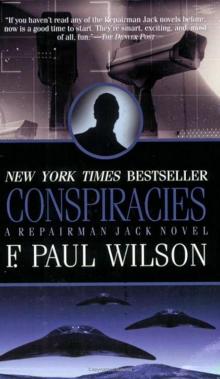 Conspiracies
Conspiracies Fear City
Fear City Wheels Within Wheels
Wheels Within Wheels Wayward Pines
Wayward Pines The Portero Method
The Portero Method All the Rage
All the Rage Infernal
Infernal The Barrens & Others
The Barrens & Others The Keep
The Keep Quick Fixes: Tales of Repairman Jack
Quick Fixes: Tales of Repairman Jack Virgin
Virgin Hosts
Hosts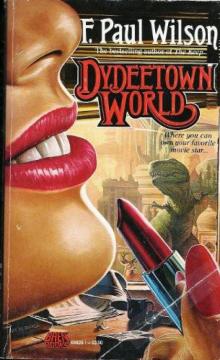 Dydeetown World
Dydeetown World Midnight Mass
Midnight Mass Black Wind
Black Wind The Christmas Thingy
The Christmas Thingy The Last Rakosh
The Last Rakosh The Last Christmas: A Repairman Jack Novel
The Last Christmas: A Repairman Jack Novel SIMS
SIMS Thy Brother's Keeper
Thy Brother's Keeper Panacea
Panacea The Touch
The Touch Scenes from the Secret History
Scenes from the Secret History Scenes From the Secret History (The Secret History of the World)
Scenes From the Secret History (The Secret History of the World) Implant
Implant The Dark at the End
The Dark at the End Fatal Error
Fatal Error Wardenclyffe
Wardenclyffe Sibs
Sibs The God Gene
The God Gene The Void Protocol
The Void Protocol Artifact
Artifact The Compendium of Srem
The Compendium of Srem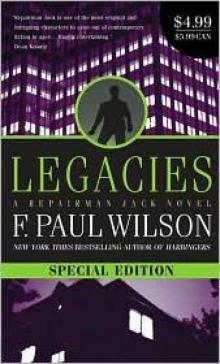 Legacies
Legacies Reprisal
Reprisal Jack: Secret Vengeance
Jack: Secret Vengeance Aftershock & Others: 19 Oddities
Aftershock & Others: 19 Oddities By the Sword
By the Sword Interlude at Duane's (Thriller: Stories to Keep You Up All Night)
Interlude at Duane's (Thriller: Stories to Keep You Up All Night) Fatal Error rj-13
Fatal Error rj-13 Crisscross rj-8
Crisscross rj-8 Codename: Chandler: Fix (Kindle Worlds Novella)
Codename: Chandler: Fix (Kindle Worlds Novella)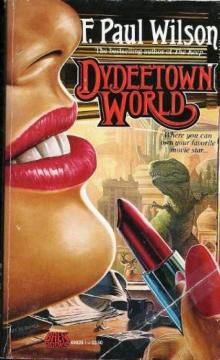 Dydeetown World lf-4
Dydeetown World lf-4 Signalz
Signalz Codename_Chandler_Fix
Codename_Chandler_Fix The Dark at the End (Repairman Jack)
The Dark at the End (Repairman Jack) The Complete Adversary Cycle: The Keep, the Tomb, the Touch, Reborn, Reprisal, Nightworld (Adversary Cycle/Repairman Jack)
The Complete Adversary Cycle: The Keep, the Tomb, the Touch, Reborn, Reprisal, Nightworld (Adversary Cycle/Repairman Jack)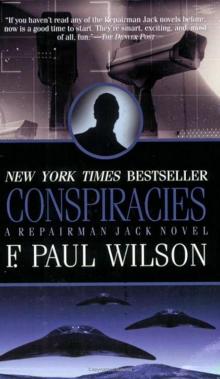 Repairman Jack 03 - Conspiracies
Repairman Jack 03 - Conspiracies Ground Zero rj-13
Ground Zero rj-13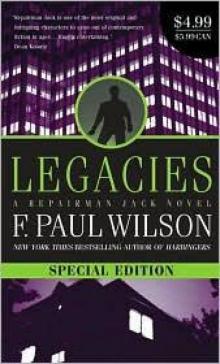 Repairman Jack 02 - Legacies
Repairman Jack 02 - Legacies The Dark at the End rj-15
The Dark at the End rj-15![Repairman Jack [02]-Legacies Read online](http://i1.bookreadfree.com/i/03/21/repairman_jack_02-legacies_preview.jpg) Repairman Jack [02]-Legacies
Repairman Jack [02]-Legacies Double Threat
Double Threat The Tery lf-5
The Tery lf-5 The God Gene: A Novel
The God Gene: A Novel Wayward Pines: The Widow Lindley (Kindle Worlds Novella)
Wayward Pines: The Widow Lindley (Kindle Worlds Novella)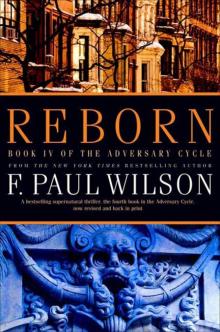 Reborn ac-4
Reborn ac-4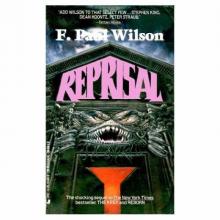 Reprisal ac-5
Reprisal ac-5 New Title 1
New Title 1 Healer lf-3
Healer lf-3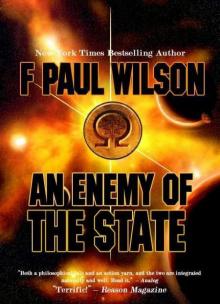 An Enemy of the State lf-1
An Enemy of the State lf-1 Interlude at Duane's
Interlude at Duane's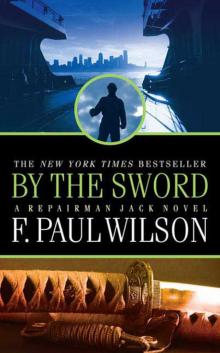 By the Sword rj-12
By the Sword rj-12 Hardbingers rj-10
Hardbingers rj-10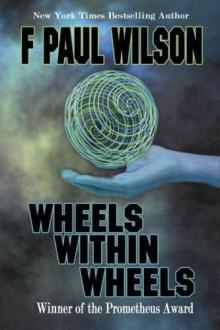 Wheels Within Wheels lf-2
Wheels Within Wheels lf-2 Jack: Secret Circles
Jack: Secret Circles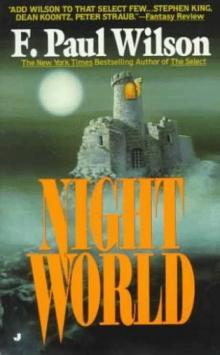 Nightworld ac-6
Nightworld ac-6 Quick Fixes - tales of Repairman Jack
Quick Fixes - tales of Repairman Jack Secret Circles yrj-2
Secret Circles yrj-2 Jack: Secret Histories
Jack: Secret Histories Haunted Air rj-6
Haunted Air rj-6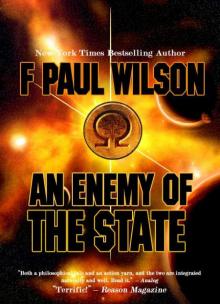 An Enemy of the State - a novel of the LaNague Federation (The LaNague Federation Series)
An Enemy of the State - a novel of the LaNague Federation (The LaNague Federation Series) Repairman Jack 05 - Hosts
Repairman Jack 05 - Hosts Cold City (Repairman Jack - the Early Years Trilogy)
Cold City (Repairman Jack - the Early Years Trilogy) The Peabody-Ozymandias Traveling Circus & Oddity Emporium
The Peabody-Ozymandias Traveling Circus & Oddity Emporium Uncommon Assassins
Uncommon Assassins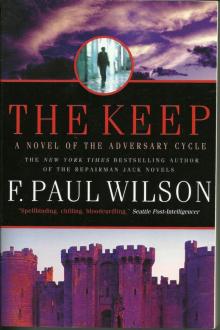 Adversary Cycle 01 - The Keep
Adversary Cycle 01 - The Keep Repairman Jack 06 - The Haunted Air
Repairman Jack 06 - The Haunted Air Bloodline rj-11
Bloodline rj-11 Ultimate Supernatural Horror Box Set
Ultimate Supernatural Horror Box Set The Keep ac-1
The Keep ac-1 Repairman Jack 04 - All the Rage
Repairman Jack 04 - All the Rage Aftershock & Others
Aftershock & Others All the Rage rj-4
All the Rage rj-4 Nightworld (Adversary Cycle/Repairman Jack)
Nightworld (Adversary Cycle/Repairman Jack)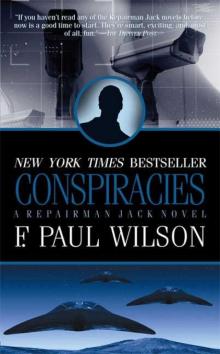 Conspircaies rj-3
Conspircaies rj-3 Hosts rj-5
Hosts rj-5 Infernal rj-9
Infernal rj-9 The God Gene: A Novel (The ICE Sequence)
The God Gene: A Novel (The ICE Sequence) Secret Histories yrj-1
Secret Histories yrj-1